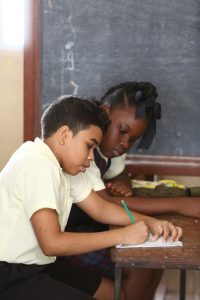– MOE outlines strict public health protocols
– limited classroom capacity, sanitisation guidelines, after-school measures and more
By Lisa Hamilton
SCHOOLS in Guyana will be in session during the period June 8 to August 15, to facilitate the preparation for, and writing of, the National Grade Six Assessment (NGSA); the Caribbean Secondary Education Certificate (CSEC) and the Caribbean Advanced Proficiency Examination (CAPE).
This decision has been solidified by a Gazetted Order signed by Minster of Education, Dr. Nicolette Henry, as of June 2, 2020. The order includes clear COVID-19 prevention guidelines to be followed by the Ministry of Education, Departments of Education, Headteachers, Mayor and City Council/Town Councils, Parent Teacher Associations and parents/guardians.
The ‘Notice COVID-19 Special Measures on the Administration of National Examination’ is given authority under the Public Health Ordinance. In so far as they differ from the COVID-19 Emergency Measures (No.3) 2020, these measures being specifically provided to meet the necessity for the holding of examinations, shall prevail.
NGSA has been set for July 1 and 2, 2020, while CSEC and CAPE will begin on July 13, 2020.
The Order states that, to prepare for national examinations, face-to-face contact between teachers and students is permitted at their respective schools, but classes shall not be held every day.
The seating arrangements for classes and the national examinations shall permit only 15 learners in each classroom or examination room at a time, sitting at least six feet apart from each other.
To control and prevent the spread of COVID-19, several measures shall be implemented by a designated responsible entity or person.
PREPARATORY MEASURES

Regarding preparatory measures, the Ministry of Education shall be responsible for ensuring that all schools have appropriate sanitation stations, including adequate water and soap, and bins with covers.
According to the Ministry, stringent monitoring should be conducted to ensure that the appropriate infrastructure is implemented prior to the commencement of classes.
Meanwhile, headteachers will be responsible for ensuring that all schools in use have a designated sickbay or quarantine area that is well-ventilated. The area must be equipped with a bed, first aid kit and personal protective gear (i.e. mask and gloves) to accommodate any learner that is suspected to be exhibiting COVID-19 symptoms until emergency assistance arrives.
“This space shall not be the headteacher’s office and should be away from the main classroom or examination room,” the Gazetted Order states.
The Ministry of Education and Ministry of Public Health are responsible for making available a designated waiting area for students to remain between their arrival at school and when they are directed to the examination room or classrooms.
The headteacher, with the support of the Department of Education in each region, shall ensure that all schools have adequate sanitation supplies such as bleach, soap powder and alcohol-based sanitisers to ensure that they are routinely cleaned daily.
Added to this, floor signage or markings indicating a physical distance of approximately 6 feet apart from persons shall be placed outside and inside the washroom areas, student waiting area and canteen. This is the responsibility of the headteacher and may be done using brightly colored tape, chalk or paint.
The headteacher is also responsible for ensuring that the examination rooms are prepared and test papers are placed on the tables before the commencement of all examinations in order to maintain physical distancing between invigilators and students.
HEALTH AND SAFETY MEASURES
When it comes to protecting the health and safety of students, the Ministry of Education will be responsible for ensuring that all candidates wear a face mask before entering into the school’s compound.
“Face masks will be on hand for distribution to students who present themselves without face mask to facilitate the conduct of examinations,” the Order indicates.
Meanwhile, the Order also gives the Ministry of Education responsibility for several other forms of safety measures. It must ensure that persons entering the school’s compound shall wash their hands with available soap and water at sinks located at the main entrance of the school.
It must also ensure that the temperature of all school staff and students shall be checked at the entrance of the examination centre. It has been advised that a medical practitioner from the school’s Community Health Centre be present at each examination centre to facilitate the checking of temperatures.
The Order states that anyone who exhibits a temperature greater than 100.4 degrees Fahrenheit or greater than 38 degrees Celsius shall be promptly isolated in the sickbay area of the school and screened by emergency medical personnel.
In addition, anyone who enters the compound shall not be allowed to leave and re-enter the compound for the day. The Order highlights: “Where it is not practical to have a clinician at every examination centre, teachers and other officers shall be trained to take temperatures.”
Cleaners have not been left out of the process as the Order states that all cleaners shall be trained in infection prevention and control practices. This is the responsibility of the Ministry of Education and headteacher. Cleaning shall be done before the commencement of daily sessions, during the break between lunch and afternoon session and at the closure of the day and shall include frequently touched surfaces such as doorknobs, tabletops, chairs, gates, sink knobs, toilet seats and handles.
The Ministry of Education and Departments of Education shall ensure that cleaners are provided with Personal Protective Equipment, including masks, to protect themselves from potential exposure to COVID-19 during the conduct of their duties.
Meanwhile, only authorized canteen vendors within the school’s compound will be permitted to operate under specific conditions. The Mayor and City Council or Town Council, where applicable, shall ensure that, under these conditions, vendors shall have copies of their food handler certificate and vendors shall be fully outfitted with protective gear including masks and gloves for use when handling food, aprons, and hairnets.
AFTER-SCHOOL MEASURES
The responsibilities given to parents and guardians state that after the end of classes or examinations, parents or guardians shall pick up their children promptly from school.

Meanwhile, the headteacher and Parent Teachers Association must ensure that students who reside outside the school’s catchment area shall remain in the classroom or examination room to await pick up by their parents or guardians. They must also ensure that students do not congregate, loiter or play in the school’s compound. Students who will be going home on their own shall be permitted to leave following the guidance of the teacher or invigilator.
On the other hand, the Ministry of Education shall provide transportation to vulnerable children who reside outside of their catchment and cannot sit the examination at the centre closest to their home.
The Order also caters for a Hot Meal Programme whereby meals shall be provided to students who are beneficiaries of the said programme.
TRANSPORTATION TO HINTERLAND REGION
To facilitate the transportation of examination papers to the hinterland regions, flight arrangements will also be made to specific locations even as the specific dates of travel are yet to be determined.
Utilising the Ogle Airport, return travel arrangements will be made to take NGSA papers to Region One: Bimichi (Moruca), Mabaruma, Port Kaituma, Matthew’s Ridge and Baramita; Region Seven: Eteringbang, Kiakan and Kamarang; Region Eight: Kato, Mahdia, Paramakatoi, Karisparu, Kopinang and Chenapou and Region Nine: Koneshen (Guns).
Meanwhile, CSEC papers will be flown to Region One: Bimichi (Moruca), Mabaruma and Port Kaituma; Region Seven: Kamarang; Region Eight: Mahdia and Paramakatoi and Region Nine: Lethem.
“For both air travels above, the flight originating from Ogle will be taking in examination papers while the flights destined for Ogle will be transporting candidate’s examination scripts,” the Order states.
On Friday, June 5, 2020, senior officials of the Ministry of Education will be engaged in a webinar on NCN Ch 11 beginning at 10:30 hours focusing primarily on the NGSA, CSEC and CAPE examinations and the public health protocols to be implemented.




.png)









